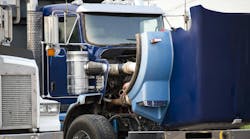Absolute Shreds is taking a bite out of identity theft crimes in the metro Detroit area by providing businesses and residents with a very valuable mobile shredding service. “We pride ourselves on personalized service, matched to our customers' needs,” says Jim Cornell, the company's director of operations.
For over 10 years, Absolute Shreds — with four shredding trucks in its private fleet — has been servicing a variety of customers and their shredding needs, including hospitals, legal offices, financial institutions and government agencies, as well as area residents.
“Although most of our business is with our regular commercial accounts, six to ten stops per week are for jobs like shredding papers in someone's garage,” Cornell advises. “Also, approximately once a month on a weekend, we'll hold community shreds, such as in the parking lot of a Senior Center, for example.”
The newest truck in the fleet is an AXO Shredders-Kenworth T300 combination unit. AXO Shredders, based in Kitchener, ON, integrated its truck body, including a high-volume (6,000 lb. of paper per hour) mobile shredding system, with a 2005 Kenworth T300 chassis, which features a Cummins ISC diesel engine rated 260 hp. and an Allison 5-sp. automatic transmission.
According to Cornell, there are different types of truck shredding systems that can be matched specifically to a job, depending on the commodity. The AXO Shredder unit, he states, is especially good at shredding very thick, dense paper, including tightly rolled blueprints, because it operates on a belt-feed rather than gravity.
“Between our four trucks, we're equipped to handle all types of commodities, from paper and media, including x-rays, microfilm, and computer diskettes, to employee badges and other types of items that could identify a person,” Cornell reports. “We've done work for the government shredding seized materials like counterfeit handbags and tennis shoes, and even 800 cartons of stolen cigarettes once.
“As far as ride, we really like the Kenworth chassis, so we tend to use this truck for jobs that are further away and require a longer drive,” he adds. “The cab is also more comfortable for two people. Some jobs take four or more hours of shredding on-site and require the driver and an assistant to complete.”
For the AXO mobile shredding truck design, switches were placed on the dash so drivers could operate the shredder from within the cab. The T300 was slightly modified with an electrical wiring package to accommodate a hydraulic system. Hydraulic lines, rather than being run outside the truck and thereby exposed to weather, are run within the AXO-Kenworth truck, reducing the potential for hydraulic leaks.
“Two PTOs are required to pump all the hydraulic fluid needed to run the shredding equipment,” Cornell explains. “The Kenworth does very well at powering everything needed by the AXO shredder unit. The truck also has a moving floor for unloading material. This is a big advantage at recycling centers that can't accommodate the 25-ft. height required to tip a truck with a dump body.
“Our trucks spend 75% of their time idling,” Cornell adds “so temperature is a big issue too. They high-idle at about 1300 rpms and run like that for hours at a time. The engine oil heats up and so does the hydraulic fluid in the shredding unit. The T300s do a good job of keeping things cool in the face of very difficult operating conditions.”
The nature of the work puts a lot of wear and tear on the trucks, so Cornell says it's important for them to be smart about scheduling and routing to maximize efficiency. For example, a lot of time is spent making sure trucks and jobs are within the same proximity, and trips to the recycling facility are worked into the driver's route to avoid extra trips across town later on.
Absolute Shreds' fleet strategy, according to Cornell, is to keep the trucks maintained well enough so as not to have to replace them before ten years. Quality control is ensured by performing all preventive maintenance in-house, at their Auburn Hills, MI, office and maintenance shop.


